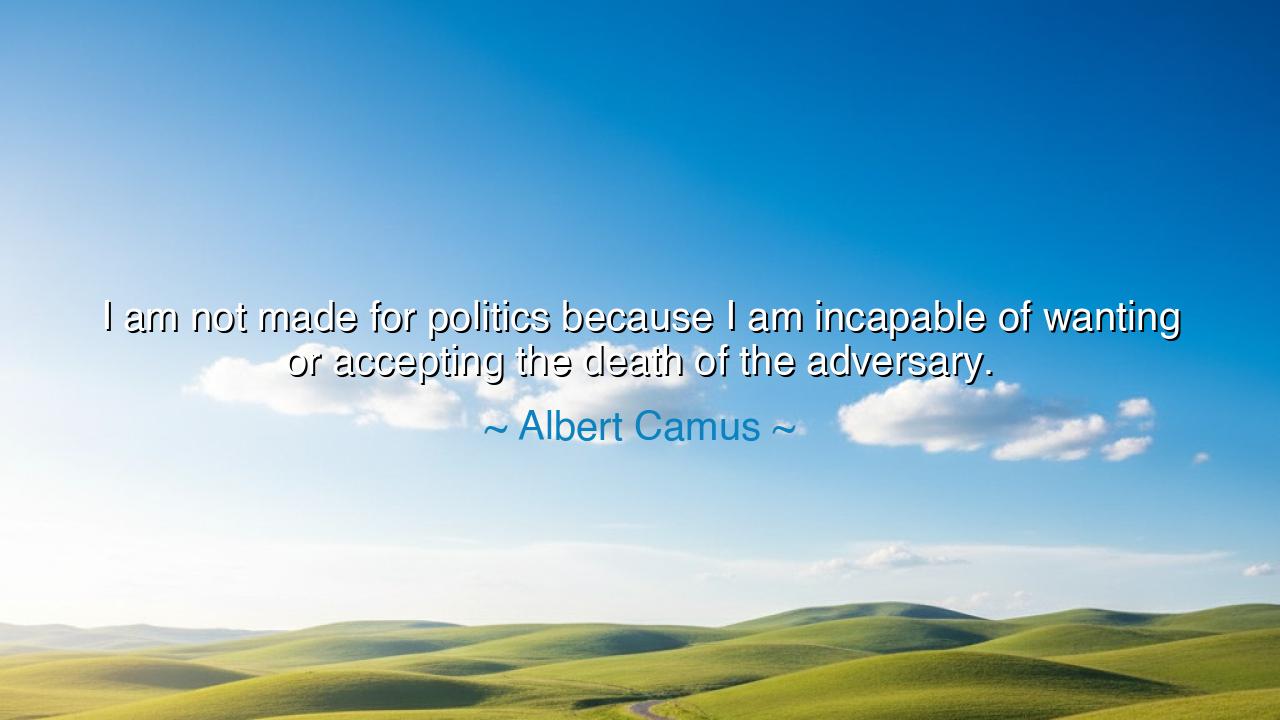
I am not made for politics because I am incapable of wanting or
I am not made for politics because I am incapable of wanting or accepting the death of the adversary.






"I am not made for politics because I am incapable of wanting or accepting the death of the adversary." — thus spoke Albert Camus, the philosopher of light and shadow, who lived through war and tyranny and yet clung to compassion as the highest virtue. In these words, he revealed both his defiance and his tenderness: that while the world may demand vengeance, he would remain loyal to life. Camus was a man of conscience who believed that justice must never turn into cruelty. His heart rejected any creed that glorified the annihilation of one’s enemy, for he saw in every human being — even the adversary — a reflection of the same fragile spark that burns within all.
The meaning of this quote reaches into the very heart of human morality. Camus understood that politics, though necessary, often demands a hardened soul — one willing to sacrifice lives, to justify cruelty for the sake of power, ideology, or victory. Yet to him, such reasoning was a betrayal of our shared humanity. He declared himself “incapable” not out of weakness, but out of moral strength. His spirit refused to be corrupted by hatred disguised as righteousness. For in wishing death upon another — whether through words, war, or indifference — one begins to mirror the very evil one opposes. Camus chose, instead, the harder path: to resist without hatred, to fight for justice without bloodlust, and to love life even in the presence of death.
The origin of these words lies deep within Camus’s life and the wounds of his age. Born in Algeria and coming of age during the horrors of World War II, he witnessed both the brutality of fascism and the vengeance of liberation. As a member of the French Resistance, he fought tyranny, yet afterward he was appalled by how easily the victors became executioners. His writings — The Rebel, The Plague, The Myth of Sisyphus — were cries against the moral emptiness of violence. For Camus, revolt was sacred only when it defended life, not when it sought to destroy. Thus, when he said he was not made for politics, he was declaring war against the logic of death that so often rules political struggle — the belief that killing one’s enemy is justified by the purity of one’s cause.
History offers many mirrors to this truth. Consider Mahatma Gandhi, who, like Camus, refused to make hatred his weapon. Against an empire of power and oppression, he waged his war through nonviolence — a revolution rooted not in the destruction of his adversaries but in their transformation. Gandhi, too, was unsuited for the politics of blood, yet his compassion conquered empires. Or think of Nelson Mandela, who after twenty-seven years in prison, emerged not with vengeance, but with forgiveness. These are the souls of whom Camus spoke — those rare beings who understand that to destroy the enemy without, one must never destroy the humanity within.
Camus’s insight is also a mirror for our own age. The world still hungers for victory more than for understanding. Nations, parties, and individuals divide themselves into camps, each certain of its righteousness and eager to see the other fall. The art of politics, once meant to unite, has become the craft of hostility. Yet Camus whispers from across time that there is no justice without mercy. To dehumanize an opponent is to poison the soil on which peace might grow. True strength lies not in the power to destroy, but in the courage to preserve one’s compassion amid conflict.
There is also a quiet heroism in his confession. To declare oneself “not made for politics” is, in truth, to declare oneself made for humanity. It takes far more courage to refuse hatred than to indulge it. The world may mock the gentle heart, calling it naïve — yet every lasting civilization, every enduring peace, has been built not by those who triumphed through violence, but by those who healed through love. Camus’s heart was too vast for the narrow theater of politics. He stood, instead, as a witness for conscience, reminding all who would listen that no cause, however noble, can justify the killing of one’s brother.
Let this then be the lesson: in your battles — whether personal, social, or spiritual — do not become what you oppose. Seek victory, but never through destruction. Defend truth, but do not let your truth extinguish compassion. When you find yourself tempted to wish harm upon another, remember Camus’s quiet resistance: to fight without hatred, to stand without cruelty, to live without surrendering the sanctity of the soul.
For in the end, as Albert Camus knew, every adversary is still human, and every human, even the fallen, carries within them the same fragile light that flickers in you. To protect that light — even in one’s enemy — is the truest act of rebellion. And it is in that act, not in conquest, that the human spirit proves its immortality.






AAdministratorAdministrator
Welcome, honored guests. Please leave a comment, we will respond soon